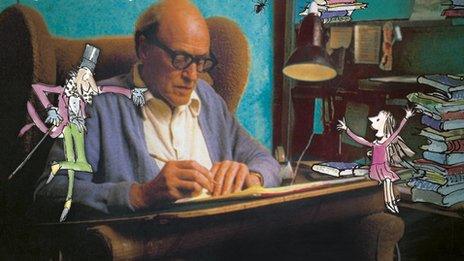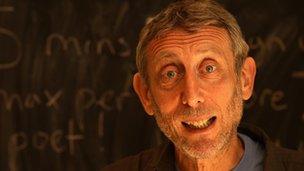Author Michael Rosen delves into Roald Dahl
- Published

The book contains some of Dahl's personal letters and photographs
The British author and poet Michael Rosen knows a thing or two about writing for children.
A former Children's Laureate, he has also written several children's books and worked extensively in schools.
His most recent project is an authorised biography of Roald Dahl, best known as the creator of timeless classics, including Charlie and the Chocolate Factory, Matilda and The BFG.
Fantastic Mr Dahl explores the inspiration for Dahl's stories, including tales about his childhood and boarding school, to his time at war.
The BBC spoke to Michael Rosen about his personal take on one of the most prolific children's authors.
You have been writing books for children and working in schools for more than 30 years. Do children better connect with an author when they have their back story?

Rosen's first book for children was called Mind Your Own Business
No, it's more the idea that if children get interested in a writer or a book or an area or scene of some sort, if they are given a sense of where writing comes from, that it isn't a mystery.
I go into schools and children say to me: "How do the words get from me into a book?" They quite seriously don't know and there's no reason why they should. It's just mysterious.
So part of the job of writers I think, as well as creating these wonderful stories, is to show them that it isn't totally mysterious; that when they are sitting in school with a pencil in their hand, they are doing just the same as writers do. So that's part of the job of writing this book.
What tools do young children need in order to be inspired to write imaginative stories?
It's not just a matter of finding words; it's also a way of thinking about how you turn your life and things that have happened in your life into ideas. I try to do that in the book and show how the books that [Dahl] came up with relate to some of the things that happened in his life.
What events in Dahl's life do you believe inspired him the most?
Plenty of things that happened, particularly around the fact that he was separated from his mum and put into these strange boarding schools, where on the one hand you learn to be self-reliant and come up with imaginative ways of living, but at the same time all kinds of cruelties are enacted on you.
I think many of his books deal with the way in which grown-ups can be cruel. He exaggerated that and then created wily and clever and cunning children who deal with this. I think a lot of that is inspired by his childhood experiences at school.
The book contains some of Dahl's personal photographs and letters. Why did you decide to include them?
It is the first time that most of the letters have ever been in print. I thought it would be interesting for children to see how the man who wrote Matilda and The Twits, how he was writing when he was their age or a bit older.
And there are other anecdotes, ones that are very personal to you...
Possibly some of the little stories about how he was as an adult. Obviously my own meeting with him, when I had just written about a giant flea in the Underground and he had just written The Twits - he made jokes with my little boy about my beard. I included those so people could get an idea about what kind of guy he was, about how he behaved.
Dahl had misfortune in his life and suffered several tragedies. How is this reflected in his writing?
I think part of his concern and care for children came from those kind of experiences. He wanted children to cherish and delight in the lives they were leading.
I think he had a very strong sense about the briefness of life. He was surrounded by young men who were dying when he was in the RAF. It would have been very painful to see your colleagues, young men in their prime, being shot down in aeroplanes.
He himself was very badly injured and then he suffered these tragedies with his own children [One of his daughters died from measles and his son was badly injured in an accident], and indeed with his father when he was just a toddler. I think he was very aware that life was short and you should make the most of it and I think that's partly why I talked about that.
You describe Dahl as hero-like because of his experiences as a fighter pilot. Do you see him as an adventurer and someone who craved excitement?
I think he craved fun. If he would have craved excitement he would have raced cars and climbed mountains.
I think he was [more of] a pleasure seeker and part of the pleasure he sought was through tricks and practical jokes. He was very intrigued by people who had schemes for things, so when he was inventing the character of Matilda's dad I think he partly based that on somebody he knew who was a bit of a rogue.
The Fantastic Mr Dahl, illustrated by Quentin Blake, is published on 13 September to coincide with Roald Dahl Day.